Overview
- Brief Narrative
- Leather tallit bag made by Fritz Silberschmidt in Zeeburgerdijk quarantine center in Amsterdam, Netherlands, in fall 1939. Fritz looked after an elderly orthodox rabbi who was ill and dying. The rabbi entrusted Fritz with his tallit, the prayer shawl that was his only possession and had been in his family for generations. Fritz saved and used the tallit for High Holidays for the rest of his life, and was buried in it upon his death in 1991. Fritz made shoes in the camp and secretly sewed this pouch from leather scraps he saved from work. It was pig leather, but Fritz felt since it was the only thing available, God would understand. He used the pouch to protect the tallit for over fifty years. Fritz, with his wife Juliane, mother Selma, and brother Rudolph fled Nazi Germany in 1939. Once Germany invaded Poland that September, even legal emigrants were detained as enemy aliens. Fritz was soon released and he and Juliane left for America in January 1940. Fritz's brother Rudolph was murdered in Auschwitz in September 1942. His mother survived in hiding and joined him in the US.
- Date
-
creation:
after 1939 September
- Geography
-
creation:
Zeeburgerdijk detention center;
Amsterdam (Netherlands)
- Credit Line
- United States Holocaust Memorial Museum Collection, Gift of Peter Silversmith
- Contributor
-
Subject:
Fred Silversmith
- Biography
-
Fritz Silberschmidt was born on October 4, 1908, in Bocholt, Germany, to a Jewish couple, Jacob and Selma Berg Silberschmidt. Jacob was a veteran of World War I (1914-1918). Selma was born on November 17, 1884, in Essen. Fritz had a brother, Rudolph, who was born on May 23, 1912. Fritz’s father Jacob died in 1927. In January 1933, Hitler came to power and soon established a Nazi dictatorship that was hostile to Jews. On November 8, Fritz moved to Cologne. Later that year, he married Juliane Else Simon. Juliane was born on September 5, 1909, in Cologne, to Eduard and Dorothea Altman Simon. Eduard was born in Thalfang on January 27, 1873. Dorothea was born in Schrimm (Srem, Poland) on August 31, 1877. In June 1936, Fritz’s mother and brother also moved to Cologne.
In 1939, Fritz, Juliane, Rudolph, and Selma decided to depart for the Netherlands, leaving behind their extended families. Nazi officials confiscated their personal and household belongings, except for three silver spoons which they were given permission to take with them. In Holland, Fritz was detained in Zeeburgerdijk quarantine center in Amsterdam. This was one of several internment camps for legal refugees that the Dutch established to handle the large influx of people fleeing Nazi rule. Fritz was assigned to make shoes in the camp. In September 1939, Germany invaded Poland, and even legal refugees were subject to internment as enemy aliens. On a visit to the camp, Rudolph told Fritz that he was going to volunteer for a factory job, hoping to protect their mother in case Germany invaded Netherlands. Fritz was eventually released from the internment center. On January 24, 1940, he and Juliane sailed from Rotterdam on the SS Veendam, arriving in New York on February 5. They settled in Boston and Americanized their names to Fred and Juliana Elsa Silversmith. They had a son in 1945. Germany occupied Netherlands in May 1940. In 1942, Juliana received a letter from the Red Cross that said her parents had been deported from Germany to Theresienstadt ghetto-labor camp in German occupied Czechoslovakia. The war ended when Germany surrendered on May 7, 1945.
They subsequently learned that Fred’s brother Rudolph was murdered in Auschwitz concentration camp on September 30, 1942. He had been sent to Westerbork transit camp on July 15, 1942, and then deported. Juliana’s parents had been arrested on June 16, 1942, in Cologne by the Gestapo and sent to Theresienstadt. On September 19, 1942, they were deported on transport Bo to Treblinka or Maly Trostenets killing center, and murdered. Fred’s mother Selma survived in hiding in the Netherlands. She joined Fred and Juliana in Boston, sailing from Gothenburg, Sweden, on the SS Gripsholm, and arriving in New York on December 2, 1946. Selma, 79, passed away on February 13, 1964. Fred, 82, died on March 17, 1991. Juliana, 90, died on April 4, 2000.
Physical Details
- Classification
-
Jewish Art and Symbolism
- Category
-
Jewish ceremonial objects
- Object Type
-
Tallith bags (lcsh)
- Physical Description
- Heavily used, hand crafted, rectangular, supple brown pigskin pouch with a short foldover flap and machine sewn seams.
- Dimensions
- overall: Height: 8.625 inches (21.908 cm) | Width: 13.500 inches (34.29 cm)
- Materials
- overall : pigskin, thread
Rights & Restrictions
- Conditions on Access
- No restrictions on access
- Conditions on Use
- No restrictions on use
Keywords & Subjects
Administrative Notes
- Legal Status
- Permanent Collection
- Provenance
- The tallit bag was donated to the United States Holocaust Memorial Museum in 2015 by Peter Silversmith, the son of Fritz Silberschmidt.
- Funding Note
- The cataloging of this artifact has been supported by a grant from the Conference on Jewish Material Claims Against Germany.
- Record last modified:
- 2022-07-28 18:31:09
- This page:
- https://collections.ushmm.org/search/catalog/irn610215
Download & Licensing
In-Person Research
- By Appointment
- Request 21 Days in Advance of Visit
- Plan a Research Visit
- Request to See This Object
Contact Us
Also in Fred and Juliana Silversmith family collection
The collection consists of three dish towels, three spoons, a tallit bag, correspondence, documents, photographs, and publications relating to the experiences of Fritz and Juliane Else Silberschmidt (after 1942, Fred and Juliana Silversmith) during the Holocaust when they fled Germany in 1939 for the Netherlands, leaving there in 1940 for the United States.
Date: approximately 1927-1939
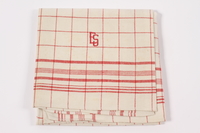
Red checked towel embroidered ES saved by German Jewish refugees
Object
Red windowpane checked dish towel monogrammed ES received as a wedding gift by Fritz and Juliane Else Silberschmidt in 1933. It was one of a pair, and they received a matching black set as well. These towels were among the very few items that they were permitted to take with them when they left Nazi Germany for the Netherlands in 1939. The rest of the family's personal and household belongings were confiscated by German authorities. Fritz and Juliane, and Fritz's mother Selma and brother Rudolph fled Cologne in 1939. After Germany invaded Poland that September, even legal emigrants were detained as enemy aliens. Fritz was interned at Zeeburgerdijk quarantine center in Amsterdam. After his release, he and Juliane left for America in January 1940. Fritz's brother Rudolph was murdered in Auschwitz in September 1942. His mother survived in hiding and joined them in the US in 1946.
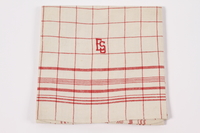
Red checked towel embroidered ES saved by German Jewish refugees
Object
Red windowpane checked dish towel monogrammed ES received as a wedding gift by Fritz and Juliane Else Silberschmidt in 1933. It was one of a pair, and they received a matching black set as well. These towels were among the very few items that they were permitted to take with them when they left Nazi Germany for the Netherlands in 1939. The rest of the family's personal and household belongings were confiscated by German authorities. Fritz and Juliane, and Fritz's mother Selma and brother Rudolph fled Cologne in 1939. After Germany invaded Poland that September, even legal emigrants were detained as enemy aliens. Fritz was interned at Zeeburgerdijk quarantine center in Amsterdam. After his release, he and Juliane left for America in January 1940. Fritz's brother Rudolph was murdered in Auschwitz in September 1942. His mother survived in hiding and joined them in the US in 1946.
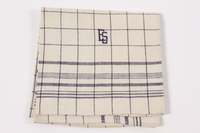
Black checked towel embroidered ES saved by German Jewish refugees
Object
Black windowpane checked dish towel monogrammed ES received as a wedding gift by Fritz and Juliane Else Silberschmidt in 1933. It was one of a pair, and they received a matching red set as well. These towels were among the very few items that they were permitted to take with them when they left Nazi Germany for the Netherlands in 1939. The rest of the family's personal and household belongings were confiscated by German authorities. Fritz and Juliane, and Fritz's mother Selma and brother Rudolph fled Cologne in 1939. After Germany invaded Poland that September, even legal emigrants were detained as enemy aliens. Fritz was interned at Zeeburgerdijk quarantine center in Amsterdam. After his release, he and Juliane left for America in January 1940. Fritz's brother Rudolph was murdered in Auschwitz in September 1942. His mother survived in hiding and joined them in the US in 1946.
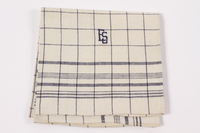
Black checked towel embroidered ES saved by German Jewish refugees
Object
Black windowpane checked dish towel monogrammed ES received as a wedding gift by Fritz and Juliane Else Silberschmidt in 1933. It was one of a pair, and they received a matching red set as well. These towels were among the very few items that they were permitted to take with them when they left Nazi Germany for the Netherlands in 1939. The rest of the family's personal and household belongings were confiscated by German authorities. Fritz and Juliane, and Fritz's mother Selma and brother Rudolph fled Cologne in 1939. After Germany invaded Poland that September, even legal emigrants were detained as enemy aliens. Fritz was interned at Zeeburgerdijk quarantine center in Amsterdam. After his release, he and Juliane left for America in January 1940. Fritz's brother Rudolph was murdered in Auschwitz in September 1942. His mother survived in hiding and joined them in the US in 1946.
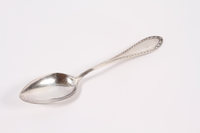
Silver oak patterned tablespoon saved by German Jewish refugees
Object
Silver oak leaf patterned spoon, one of three spoons brought with Fritz and Juliane Else Silberschmidt when they escaped Nazi Germany for the Netherlands in 1939. These spoons were among the very few items that they were permitted to take with them when they left Cologne. The rest of the family's personal and household belongings were confiscated by German authorities. Fritz and Juliane, and Fritz's mother Selma and brother Rudolph fled to Amsterdam in 1939. After Germany invaded Poland that September, even legal emigrants were detained as enemy aliens. Fritz was interned at Zeeburgerdijk quarantine center in Amsterdam. After his release, he and Juliane left for America in January 1940. Fritz's brother Rudolph was murdered in Auschwitz in September 1942. His mother survived in hiding and joined them in the US after the war in 1946.
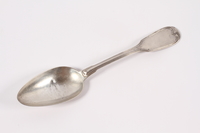
Silver fiddle patterned tablespoon saved by German Jewish refugees
Object
Silver spoon with a fiddle thread pattern, one of three spoons brought with Fritz and Juliane Else Silberschmidt when they escaped Nazi Germany for the Netherlands in 1939. These spoons were among the very few items that they were permitted to take with them when they left Cologne. The rest of the family's personal and household belongings were confiscated by German authorities. Fritz and Juliane, and Fritz's mother Selma and brother Rudolph fled to Amsterdam in 1939. After Germany invaded Poland that September, even legal emigrants were detained as enemy aliens. Fritz was interned at Zeeburgerdijk quarantine center in Amsterdam. After his release, he and Juliane left for America in January 1940. Fritz's brother Rudolph was murdered in Auschwitz in September 1942. His mother survived in hiding and joined them in the US after the war in 1946.
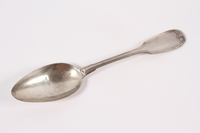
Silver fiddle patterned tablespoon saved by German Jewish refugees
Object
Silver spoon with a fiddle thread pattern, one of three spoons brought with Fritz and Juliane Else Silberschmidt when they escaped Nazi Germany for the Netherlands in 1939. These spoons were among the very few items that they were permitted to take with them when they left Cologne. The rest of the family's personal and household belongings were confiscated by German authorities. Fritz and Juliane, and Fritz's mother Selma and brother Rudolph fled to Amsterdam in 1939. After Germany invaded Poland that September, even legal emigrants were detained as enemy aliens. Fritz was interned at Zeeburgerdijk quarantine center in Amsterdam. After his release, he and Juliane left for America in January 1940. Fritz's brother Rudolph was murdered in Auschwitz in September 1942. His mother survived in hiding and joined them in the US after the war in 1946.
Silberschmidt Family Collection
Document
Contains documents, photographs, and correspondence illustrating the experiences of Julianne Elise and her husband Fritz Silberschmidt, who fled Germany in 1939, leaving behind extended family. Included in the correspondence are a number of letters from Selma and Rudolf Silberschmidt, mother and brother of Fritz. Rudolph was deported and did not survive; Selma survived in hiding in the Netherlands. Also included are military documents issued to Selma's husband, a veteran of WWI who passed away in 1927, as well as documents illustrating efforts of Fritz and Julianne to leave in 1939.
German book
Object
Novel brought with Fritz and Juliane Else Silberschmidt when they escaped Nazi Germany for the Netherlands in 1939. It was among the very few items that they were permitted to take with them when they left Cologne. The rest of the family's personal and household belongings were confiscated by German authorities.
Haggadah
Object
Child's Hagadah brought with Fritz and Juliane Else Silberschmidt when they escaped Nazi Germany for the Netherlands in 1939. It was among the very few items that they were permitted to take with them when they left Cologne. The rest of the family's personal and household belongings were confiscated by German authorities.




